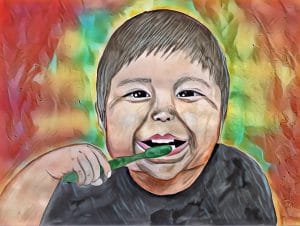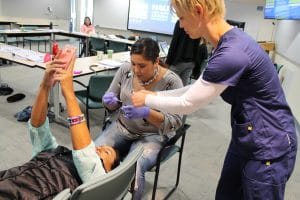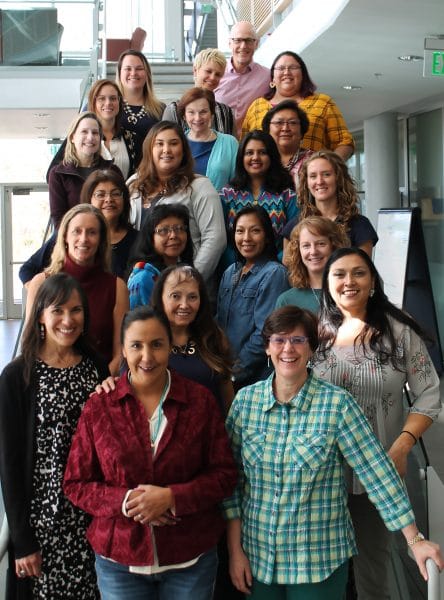For copies of PowerPoints and information sheets, please reach out to the below project staff
Project contacts
Christine Kirby, MA
Skyler Bordeaux, MPH
Heather Thomas, RDH, MEd
Julie A. Baldwin, PhD
Great Beginnings for Healthy Native Smiles
An early childhood caries prevention program

American Indian children are four times more likely to suffer from untreated dental caries when compared to white children.1 High rates of early childhood caries (ECC; one or more decayed, missing, or filled teeth in a child younger than 6 years of age)2 in American Indian children impact the well-being of their families and communities because of the associated problems that result from untreated ECC such as infection, chronic pain, tooth loss, dental disease, poor nutrition, impaired growth, and poor general health.3 Dental disease has also been linked to other serious chronic health conditions like premature/low birth weight, diabetes, cardiovascular diseases, and stroke.4
Grant funding and how NAU Principal Investigators work within communities

Funded by a one-year bridge grant from the National Institute of Dental and Craniofacial Research, Great Beginnings for Healthy Native Smiles aims to understand the social, cultural, environmental, and structural factors associated with ECC and to create a program that will reduce the burden in two American Indian communities. To explore factors and influences related to ECC in Tribal communities, CHER investigators have partnered with the Hopi Tribe and Hopi Health Center in Arizona and the Crow Tribe and Little Big Horn College in Montana.
The research team includes key Tribal healthcare providers, cultural experts, faculty and staff at NAU, and internationally recognized researchers in ECC within Indigenous populations. In addition, the principal investigator of the project, Dr. Julie Baldwin, is an American Indian Tribal member. This research team will collect qualitative data from focus groups and interviews with health and social service providers, mothers and caregivers of young children, and members of the Tribal communities. A Community Advisory Board consisting of expectant and new mothers, as well as health and service providers from the communities, will also be consulted frequently.
 Perspectives of these groups will be instrumental in understanding the social, cultural, and environmental experiences shared by the Hopi and Crow communities. The insight gained from these conversations will provide insight into how to adapt a culturally compatible intervention for ECC prevention that considers the unique social determinants of health experienced by American Indian mothers and their children.
Perspectives of these groups will be instrumental in understanding the social, cultural, and environmental experiences shared by the Hopi and Crow communities. The insight gained from these conversations will provide insight into how to adapt a culturally compatible intervention for ECC prevention that considers the unique social determinants of health experienced by American Indian mothers and their children.
Project personnel and references
Northern Arizona University Accordion Closed
- Julie Baldwin, PhD, Principal Investigator, Professor, Department of Health Sciences
Director, Center for Health Equity Research - Steven Barger, PhD, Professor, Psychological Sciences
- Christine Kirby, MA, Research Coordinator Sr.
Center for Health Equity Research - Heather Thomas, RDH, SS, MEd, Assistant Clinical Professor
Department of Dental Hygiene - Dawn Clifford, PhD, RD, Associate Professor
Department of Health Sciences - Marissa Tutt, MPH, Research Coordinator
- Skyler Bordeaux, MPH, Research Coordinator
The Hopi Tribe Accordion Closed
- Joyce Hamilton, Director, Hopi Department of Health and Human Services, Site PI
- Stephanie Hyeoma, Site Coordinator
Community Liaisons and Consultants in Montana Accordion Closed
- Sara L Young
- Gerlinda Morrison, DPT, Site PI, Site Coordinator
Study Publications Accordion Closed
Study outcomes paper in progress. Please check back for updates.
Content References
1. Ricks TL, Phipps KR, Bruerd B. (2015). The Indian Health Service early childhood caries collaborative: a five-year summary. Pediatric Dentistry, (373), 275–280.
2. AAPD. American Academy of Pediatric Dentistry: ECCstats. Accessed April 5, 2016.
3. Colak, H, Dülgergil, CT, Dalli, M, & Hamidi, MM. (2013). Early childhood caries update: a review of causes, diagnoses, and treatments. Journal of Natural Science, Biology, and Medicine, 4(1), 29–38.
4. Office of Oral Health, Arizona Department of Health Services, Arizona Oral Health Survey of Preschool Children 2009©; Arizona Healthy Bodies, Healthy Smiles Survey 2010©